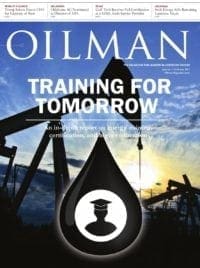During the oil and gas slowdown the last two years, employees across many sectors of the industry were laid off, wage increases were limited, and many were denied promotions. The brighter side to that unfortunate slowdown was many employees took that as an opportunity to improve their skills by attending seminars, streaming webinars, and brushing up on knowledge that would propel them for better opportunities as the industry turned around. A wise decision for those that are still employed, as well as for the unemployed seeking a marketing advantage over the next candidate.
Our feature in this edition takes a look at education and training technology the oil and gas industry will need for the future. It’s difficult to know what specific niche skills will be in demand ten years from now; however, starting from the basics of what we know today, either through a bachelor’s degree, a trade program, such as welding technology, and even a graduate degree to learn advanced techniques, is the best approach for a successful career.
Learning the latest skills and knowledge is often found in continuing education and advanced certification programs. It is proven that on-the-job training and real-world practice is the best way to learn a skill and gain knowledge. But once you’ve reached your profession’s standard body of knowledge through higher education or on-the-job training, over time standard practices change, ways of doing tasks become obsolete, and new techniques and knowledge are introduced to the field, as the oil and gas industry advances. Some have even found that attending trade shows provide valuable knowledge they can use at work.
There is no doubt that completing continuing education courses, learning an in-demand industry skill, earning a degree, or joining a professional organization, is the best investment you can make in yourself for an industry that is in constant change.
The CEO of U.S. Energy Media, Emmanuel Sullivan is a technical writer who has built up his profile in the oil and gas industry. He lives and works in Houston, where he publishes Oilman and Oilwoman on a bimonthly basis, and Energies quarterly, distributing the magazine to energy thought leaders and professionals throughout the United States and around the world. At a time when technology is rapidly changing, he provides an invaluable service to oil & gas, and renewable energy executives, engineers, and managers, offering them both broad and specific looks at the topics that affect their livelihoods. Sullivan earned his BA in Communications at Thomas Edison State University and his MA in Professional Writing at Chatham University.












